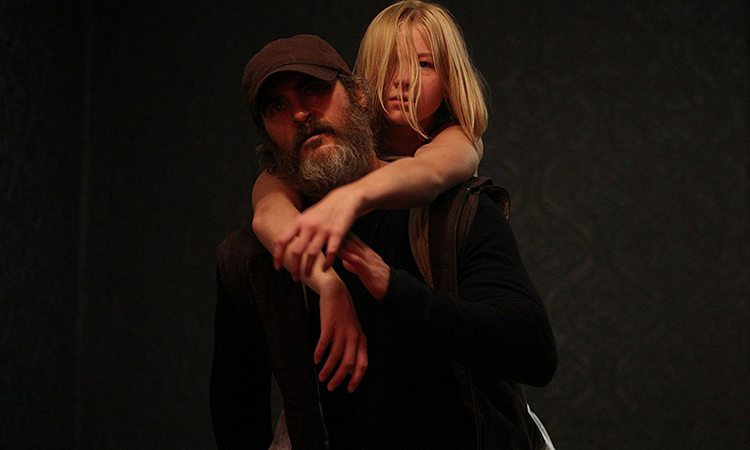How should movie studios market arthouse masterpieces? There’s no simple answer, given that the majority of moviegoers want blockbuster escapism instead of arthouse masterpieces. Paramount Pictures ran into this problem with “mother!”, a cerebral allegory that they marketed as a traditional horror in order to get butts into seats. Thankfully, newcomers like the eight-year-old Amazon Studios are purveyors of risky art, and they’ve been marketing “You Were Never Really Here” like the rarity that it is—which is why not enough people will see it.
The narrative of “You Were Never Really Here” echoes revenge thrillers like “Taken”, and it’s based on a book with over a hundred pages of plot. But this adaption is written and directed by Lynne Ramsay, a filmmaker who eviscerates the extraneous exposition of novels that inspire her and disappears soon after. Nine years passed between her first and second film adaptions; six between her second and third. We still haven’t recovered from “We Need to Talk About Kevin”, her foray into the psychology of school shootings, but she’s ready to bring the hurt.

Joe is a military veteran and former FBI agent struggling with debilitating PTSD. He spends his days as a contract killer who specializes in hammering child traffickers to death. Joe is also a bearded Joaquin Phoenix, who turns in a stunning performance that rivals (and possibly exceeds) his work in “The Master” and “Her.” He clenches the firm sinews of a cold-blooded killer, yet sinks deep into waves of weakness that wash over his mind. Inside his psyche, Phoenix fuses an unmovable object with open wounds, creating a Joe more captivating than dialogue could convey.
Ramsay planned accordingly for this, as her film contains as little dialogue and plot as possible. Joe is paid to rescue the abducted daughter of a US Senator, things go wrong, and Joe anxiously tries to pick up the pieces. That’s really all we get from a narrative perspective. Ramsay’s weapon of choice is more precise than Joe’s: she takes a razor to the plot of the book, slicing away unnecessary fat like answers to major story questions. She’s interested in what lies beneath, in pulling out thematic guts and splashing blood on the screen with a flick of her dauntingly talented wrist.
Her directorial style is indeed a cinematic splatter painting. She breaks conventional filmmaking rules left and right, distorting sound design and deliberately cutting away from action in order to displace Joe. It’s an orchestra of disorientation: passing cars screech with unbearable shrills, smiles are shot like they’re disturbing artifacts of a lost world, flashes of subliminal horror permeate mundane activity and violent clashes occur off-screen.
Working in conjunction with a contagiously dark score from Jonny Greenwood and melancholy cinematography from Thomas Townend, Ramsay rends the viewer from reality and casts them into the disparate static of Joe’s existence. “You Were Never Really Here” explores the cycle of violence through the formal elements of film alone; it never falls back on written explanation to depict how violence done to children shapes our adults—and thus our world.
The movie’s beauty is just as haunting as its horror. One shot was so gorgeous that I could’ve watched it for hours. “You Were Never Really Here” is pure cinema, it’s unforgettable, and it’s perfect.
★★★★★ (5/5)




